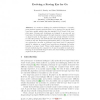Free Online Productivity Tools
i2Speak
i2Symbol
i2OCR
iTex2Img
iWeb2Print
iWeb2Shot
i2Type
iPdf2Split
iPdf2Merge
i2Bopomofo
i2Arabic
i2Style
i2Image
i2PDF
iLatex2Rtf
Sci2ools
110
click to vote
GECCO
2004
Springer
2004
Springer
Evolving a Roving Eye for Go
Go remains a challenge for artificial intelligence. Currently, most machine learning methods tackle Go by playing on a specific fixed board size, usually smaller than the standard 19×19 board of the complete game. Because such techniques are designed to process only one board size, the knowledge gained through experience cannot be applied on larger boards. In this paper, a roving eye neural network is evolved to solve this problem. The network has a small input field that can scan boards of any size. Experiments demonstrate that (1) The same roving eye architecture can play on different board sizes, and (2) experience gained by playing on a small board provides an advantage for further learning on a larger board. These results suggest a potentially powerful new methodology for computer Go: It may be possible to scale up by learning on incrementally larger boards, each time building on knowledge acquired on the prior board.
Board Sizes | GECCO 2004 | Larger Boards | Roving Eye |
| Added | 01 Jul 2010 |
| Updated | 01 Jul 2010 |
| Type | Conference |
| Year | 2004 |
| Where | GECCO |
| Authors | Kenneth O. Stanley, Risto Miikkulainen |
Comments (0)

